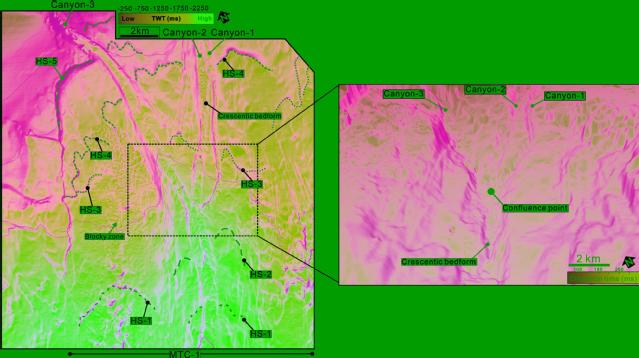Nan Wu1*, Harya D. Nugraha2, Guangfa Zhong1, Michael J. Steventon3
1State Key Laboratory of Marine Geology, Tongji University, Shanghai 200092, China
2Center for Sustainable Geoscience, Universitas Pertamina, Jakarta, 12220, Indonesia
3Shell Research, Shell Centre, London, SE1 7NA, UK.
Email: nanwu@tongji.edu.cn
The offshore area of the Otway Basin (SE Australia) is dominated by a multibranched canyon system where mass-transport complexes (MTCs) are widely distributed. Our study integrates high-resolution multibeam and seismic data to investigate the importance of MTCs in dictating the evolution of canyons. Our study interprets three regionally distributed MTCs that fail retrogressively and affect almost 70% of the study area. Within the MTCs, seven canyons that initiated from the continental shelf edge and extended to the lower slope are observed. Although the canyons share common regional tectonics and oceanography, the scales, morphology, and distribution are distinctly different. This is linked to the presence of failure-related scarps that control the initiation and formation of the canyons. The retrogressive failure mechanisms of MTCs have created a series of scarps on the continental shelf and slope regions. In the continental shelf, where terrestrial input is absent, the origin of the canyons is related to local failures and contour current activities, occurring near the pre-existing larger headwall scarps (c. 120 m high, 3km long). The occurrence of these local failures has provided the necessary sediment input for subsequent gravity-driven, downslope sediment flows. In the continental slope region, the widespread scarps can capture gravity flows initiated from the continental shelf, developing an area of flow convergence, which greatly widens and deepens the canyon system. The gradual diversion and convergence through MTC related scarps have facilitated the canyon confluence process, which has fundamentally changed the canyoning process. Thus, our study concludes that the retrogressive failure mechanism of MTCs has a direct influence on the initiation, distribution, and evolution of the canyons. The scarps associated with MTCs have greatly facilitated the delivery of sediments and marine plastics from the shelf edge into the deep oceans, especially in areas where fluvial input is missing.
Keywords: Mass-transport complexes (MTCs); Submarine canyons; Otway Basin; South-east Australia
Full Article: https://onlinelibrary.wiley.com/doi/epdf/10.1111/sed.12987



